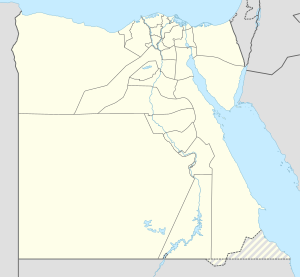Sais, Egypt
| Sais | |
|---|---|

Map of Sais ruins drawn by Jean-François Champollion during his expedition in 1828.
|
|
| Location in Egypt | |
| Coordinates: 30°57′53″N 30°46′6″E / 30.96472°N 30.76833°E | |
| Country |
|
| Governorate | Gharbia |
| Time zone | EST (UTC+2) |
| • Summer (DST) | +3 (UTC) |
| Sais in hieroglyphs | ||||||
|---|---|---|---|---|---|---|
Sau (Zau) Sꜣw (Zꜣw) |
||||||
| Greek | Σάϊς (Sais) | |||||
Coordinates: 30°57′53″N 30°46′6″E / 30.96472°N 30.76833°E
Sais (Ancient Greek: ) or Sa El Hagar was an ancient Egyptian town in the Western Nile Delta on the Canopic branch of the Nile. It was the provincial capital of Sap-Meh, the fifth nome of Lower Egypt and became the seat of power during the Twenty-fourth dynasty of Egypt (c. 732–720 BC) and the Saite Twenty-sixth dynasty of Egypt (664–525 BC) during the Late Period. Its Ancient Egyptian name was Zau.
Herodotus wrote that Sais is where the grave of Osiris was located and that the sufferings of the god were displayed as a mystery by night on an adjacent lake.
The city's patron goddess was Neith, whose cult is attested as early as the 1st Dynasty, ca. 3100- 3050 BCE. The Greeks, such as Herodotus, Plato and Diodorus Siculus, identified her with Athena and hence postulated a primordial link to Athens. Diodorus recounts that Athena built Sais before the deluge that supposedly destroyed Athens and Atlantis. While all Greek cities were destroyed during that cataclysm, the Egyptian cities including Sais survived.
...
Wikipedia

